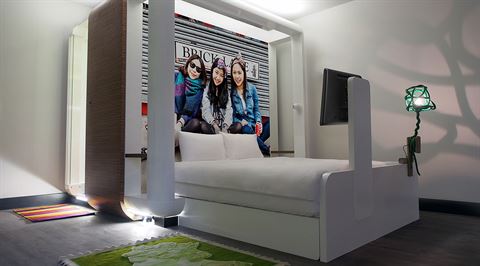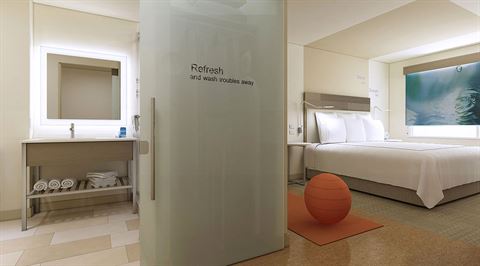Inspiration • April 2014
Hotel experimental: seven big new ideas
We take hotel essentials like minibars and en suite bathrooms for granted, but they were groundbreaking innovations in the 20th century. But what can modern travellers expect in an age that finds us more demanding, strapped for time and ruled by technology? The Club investigates

Flatpack rooms
The Qbic Hotel London City brought fresh thinking on sustainability when it opened last year: each of the 171 guest rooms features the Cubi, a pod-like structure that contains everything you need in a hotel room, including bathroom fittings and chic Scandinavian furnishings (think Ikea-style build-your-own room). “The idea is that it can be inserted into existing buildings quickly and efficiently, with little impact on the environment, to give neighbourhoods a new lease of life,” says Paul Janmaat, Qbic’s CEO and MD.
Curating experiences
“We’ve curated art on digital frames and music playlists in our latest New York property,” says Robin Chadha, chief marketing officer of citizenM. “But I’d like to create a Citizen app, so that guests can order pizza or get their dry-cleaning done by local businesses, rather than paying premium rates. We’d curate it, so it would the best pizza or the best dry-cleaners in the city. It would be charged to the same credit card that the room’s booked under, so it would be completely hassle-free.”
Keyless room access
Paper check-in is slowly becoming a thing of the past, but the latest technology at Starwood Hotels and Resorts allows guests to use their smartphones to access their room as well as check in. “The innovation was developed in collaboration with Assa Abloy, a lock partner in Sweden,” explains Frits van Paasschen, the group’s CEO. “The plan is to pilot the first in key-tech hubs, leading with the Aloft Harlem and Aloft Cupertino hotels in the next three months.”
Co-creation with customers
The headquarters of Marriott International in Maryland features a 10,000sq-ft innovation lab called The Underground, where employees and hotel owners brainstorm new ideas with their guests. “We are listening to the needs of millennials and approaching the future of travel in a way that is collaborative, comprehensive and authentic,” says Belinda Pote, chief sales and marketing officer for Marriott International, Europe. “Our next-generation meeting spaces are good examples of this: stylish design, natural light, flexible seating and wireless technology. We’ll be unveiling a next-generation guest room later this year.”

Personalised hotels
“Hotel brands have traditionally concentrated on being 2D: how to be both global and local,” says Richard Solomons, CEO of InterContinental Hotels Group. “But our research from the IHG 2014 trends report shows that the rise of personalisation means brands must be 3D: global, local and personal.” The group’s latest EVEN hotel is a good example. Targeting wellness-minded travellers, it places importance on organic, healthy menus, in-room fitness zones and smartphone-enabled jogging maps.
Concierge apps
Hilton Hotels and Resorts installed the first hotel minibar in Hong Kong in the 1970s and hasn’t stopped innovating since. Take its Conrad Concierge app, which lets guests customise their stay before and during their trip, whether that’s bespoke toiletries and pillow preference or mobile checkout. “Hotel-specific perks include a shoe-shine service which can be ordered at Conrad New York, and a yoga mat to be placed in your room to encourage relaxation at Conrad Koh Samui,” adds Chris Naylor, vice president product services, Hilton Worldwide.
The lab hotel
Hyatt Andaz Liverpool Street London was one of the group’s first hotels where innovations such as iPad check-in were tested on its modern, high-tech guests. “Our hosts respond to each guest’s needs,” says Eric Brun, vice president of brands, Europe, Africa, Middle East and Asia. “If they arrive relaxed, we invite them to the lounge and offer complimentary refreshment. If time is of the essence, it’s straight to the room, taking care of check-in on the way.”
This article has been tagged Technology, Hotels